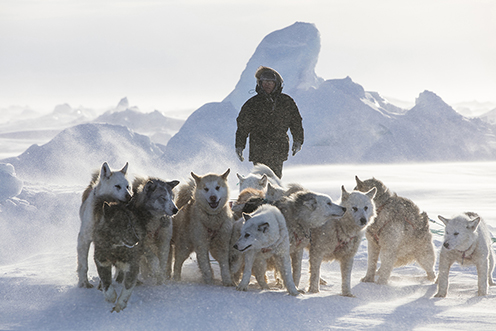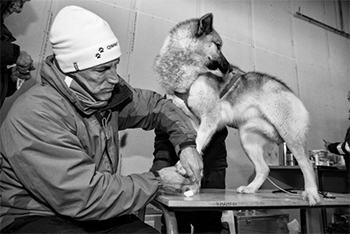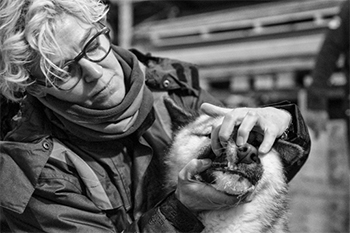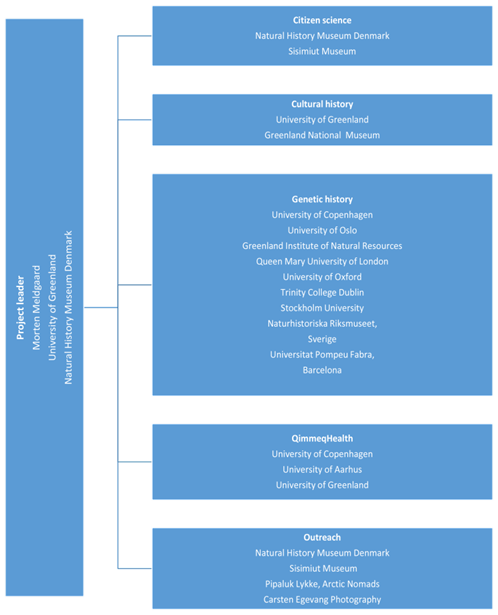About

Photo: Carsten Egevang
About the Qimmeq project
QIMMEQ is a research project about the sled dog culture and the origin and genetic history of the sled dog.
The Greenlandic sled dog culture and technology has a history that reaches more than 4000 years back in time. It is iconic and references to it are numerous. Without it the Thule People from which modern Greenlanders descend, would have had a hard time colonizing the New World´s arctic areas and without these dogs polar explorers like Roald Amundsen and Robert Peary would never have reached the Poles.
Today, Greenland holds the Arctic’s largest remaining sled dog population and a globally unique traditional dog sled culture. But both the sled dog and the culture that goes with it are threatened by extinction.
Even though sled dogs are iconic and dog sled culture plays an essential role in Greenland and despite the subject holding great scientific interest only limited systematic work has previously been done on these matters.
The six most important goals of the Qimmeq Project
- Collect and research knowledge about the Greenland sled dog, its genetics and culture history.
- Encourage, create and sustain interest and pride in the sled dogs and the surrounding culture and thus help sustain a viable sled dog culture for the future.
- Help secure a genetically healthy dog population.
- Share knowledge and research results, develop communication tools, and disseminate results within the Greenlandic and the arctic community, and globally.
- Full fill the goals of Greenland Perspective.
- Be a role model for future research projects beyond the Qimmeq project.
A Greenland Persepctive project
QIMMEQ - Greenland’s Sled Dog is a Greenland Perspective project under the aegis of the University of Greenland, the Natural History Museum of Denmark and the University of Copenhagen.
Greenland Perspective is an multi-disciplinary, multi-national research initiative, which works on the basis of a set of precepts aimed at the activation of the initiative’s research projects into Greenlandic society. Greenland Perspective works according to three precepts, which projects, to the greatest extent possible, should live up to:
- UNIQUE RESOURCES: Based on a number of academic viewpoints, the research project should help identify Greenland’s special characteristics and explore how these special human, natural or societal characteristics can support harmonious development in Greenland.
- GLOBAL CHALLENGES: The research project should help reveal how the uniqueness of Greenland could help solve some of the world’s global challenges, such as the destruction of ecosystems and increasing pressure on food safety.
- COLLABORATION: The research project should collaborate with the education system, public authorities, business and civil society to ensure that the research is activated into, and experienced as relevant to Greenlandic society.
QimmeqHealth

QimmeqHealth (QH) represents a health-focused component of Qimmeq. QH seeks to elucidate the general health and disease history of the Greenlandic sled dog in Greenland, as well as to ascertain the cause- and important risk factors for recurrent disease outbreaks. Together with the Greenlandic society, QH moreover wish to build a strategy for securing an overall healthy and sustainable sled dog population for the future in Greenland.

The general and dramatic decline in sled dog populations in Greenland is caused among other by the accentuated climate changes in the Arctic region and subsequent changes in hunting practices, but it is also affected by recurrent outbreaks of disease which may decimate or even wipe out entire local sleddog populations. QH aims to investigate the epizootiology of these outbreaks, including identification of possible health-related risk factors. Thus, the overall goals of QH are:
- To secure a healthy and sustainable population of the unique Greenlandic sled dog for future Greenland, thereby also protecting the sled dog culture.
- To mitigate the occurrence of disease outbreaks.
- To establish a Greenlandic course of basic veterinary skills rooted at University of Greenland and with the aim of providing veterinary competencies in the sleddog area of Greenland.
- To communicate scientific results of health-related topics in relation to the Greenlandic sled dog for the Greenlandic people, as well as the circumpolar communities where a general interest for the conservation of the Arctic sled dogs exists.
In addition to the overall goals of QH, the activities will provide essential inputs for the on-going national vaccination program initiated by the Greenlandic Government in 2016.
Supported by
HealthTHE VELUX FOUNDATION and the Aage and Johanne Louis-Hansen Foundation are supporting the project to the tune of DKK 4.5 million and DKK 2.1 million respectively.
Organisation














 FACEBOOK
FACEBOOK LINKEDIN
LINKEDIN Copy link
Copy link
